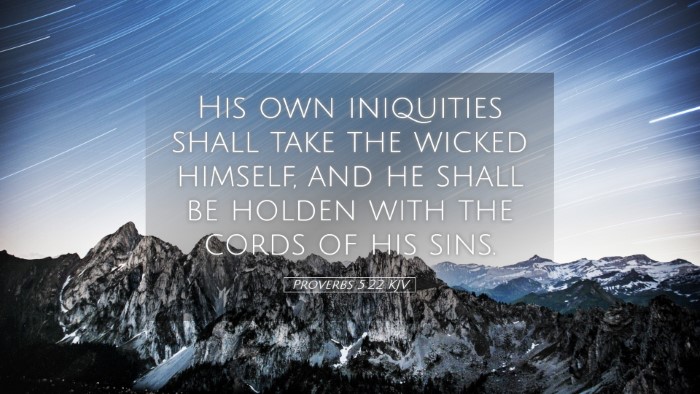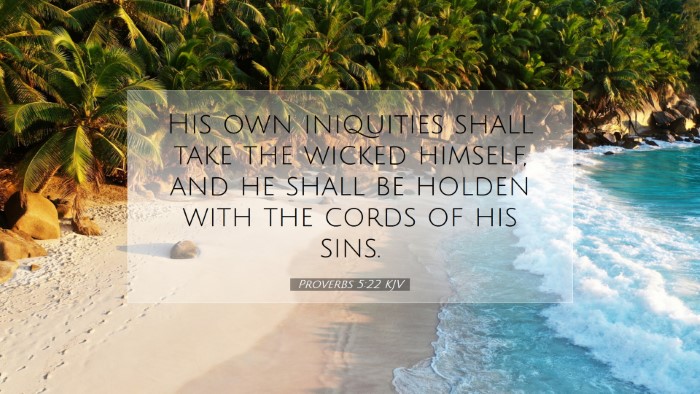Commentary on Proverbs 5:22
Proverbs 5:22 states: "His own iniquities shall take the wicked himself, and he shall be holden with the cords of his sins."
Introduction
The book of Proverbs is a rich source of wisdom literature, guiding readers in righteous living and warning against the dangers of sin. In this particular verse, the message revolves around the inescapable consequences of one’s own actions, especially when it comes to sin.
Insights from Matthew Henry
Matthew Henry, in his commentary, emphasizes the idea that the wicked can often feel invulnerable, believing they can escape the consequences of their actions. However, he notes that their own iniquities ultimately ensnare and hold them captive. In essence, they are bound by their own sinful choices.
- Iniquities as a Trap: Henry draws the analogy of a trap; just as a hunter ensnares an animal, so too do sins encircle a person. The phrase "holden with the cords of his sins" serves as a metaphor for the binding nature of these transgressions.
- No Escape: He articulates that while the wicked may think they are acting without consequence, they are actually accumulating chains that will inevitably catch up with them. Their actions betray a lack of foresight regarding the moral order of the universe.
Insights from Albert Barnes
Albert Barnes provides a valuable perspective on the self-destructive nature of sin. He highlights how a person's own sins gauge their downfall, underscoring the concept that individuals ultimately become victims of their transgressions.
- Self-Destruction: Barnes notes that "the wicked himself" signifies that the sinner’s downfall is often self-inflicted, arising from their own decisions and misdeeds.
- Symbolism of "Cords": The "cords of his sins" are symbolic of the very traits that bring forth judgment and suffering. Barnes suggests that these cords constrict the individual, leading to both spiritual and physical degradation.
Insights from Adam Clarke
Adam Clarke's commentary delves into the psychological aspect of sin, portraying how sinners are often led by their desires. He argues that the perpetual indulgence in sin creates a pattern that becomes difficult to break.
- Desires and Deceit: Clarke explains that the wicked are often deceived by their desires, believing they can continue in sin without facing repercussions. This deceptive state ultimately leads to their ensnarement.
- Culpability of the Individual: According to Clarke, the verse serves as a powerful reminder of personal responsibility. Each individual must acknowledge their role in their spiritual demise, affirming that the seeds of sin will yield a bitter harvest.
Theological Reflections
As we reflect on Proverbs 5:22, a few theological themes emerge that are significant for pastors, students, and theologians alike.
- The Nature of Sin: The verse portrays sin not merely as an action but as a binding force that ensnares individuals, highlighting the intrinsic consequences of immoral choices.
- Divine Justice: It implies a form of divine justice, where God allows individuals to face the repercussions of their actions, serving both as a warning and a call to repentance.
- Spiritual Warfare: The idea of being "holden" by one's sins suggests an ongoing struggle within individuals, emphasizing the need for spiritual warfare against temptation and moral failure.
Practical Applications
This verse serves as a stark reminder of the realities of sin and its implications for personal conduct and community ethics.
- Accountability: Individuals should be encouraged to take responsibility for their actions, recognizing that what they cultivate spiritually may lead to their spiritual bondage.
- Prevention of Sin: The community of believers should foster an environment that emphasizes accountability and encourages one another to avoid temptation and sin.
- Seeking Redemption: The message of the gospel is pivotal here, portraying the path to freedom from the cords of sin through repentance and faith in Christ.
Conclusion
Proverbs 5:22 serves as a potent reminder that our sins can ensnare us, threading through the pages of life with their consequences. Through the insights gathered from the commentaries of Matthew Henry, Albert Barnes, and Adam Clarke, we understand the deeper implications of living in accordance with divine wisdom. It calls us to vigilance, personal accountability, and reliance on God's grace to break free from the restraints of our sins.


